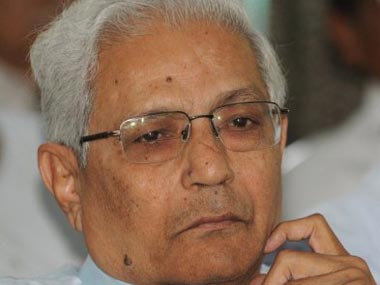
A retired Gujarat High Court judge, Mehta, blasted the Modi government for calling him "biased" and "anti-government" while opposing his appointment.
A Lokayukta unwanted by the government cannot get all the necessary and timely support from it, he said in a letter to Gujarat Governor Kamla Beniwal who had appointed him, triggering a standoff with the Modi government.
Maintaining that the "appointment has lost all the grace and dignity", the former judge said he was withdrawing his consent as "he could not persuade himself to accept the office of Lokayukta".
"I humbly withdraw my consent for the appointment as the Gujarat Lokayukta and decline to assume the office. Kindly accept my request and relieve me," Mehta said in his 7-page letter.
"I am averse to any controversy and try to keep away. The present controversy has denigrated the office of the Lokayukta and adversely affected its credibility. The appointment has lost all the grace and dignity," he said.
By-passing the state government, Governor Beniwal had appointed Mehta as Lokayukta on August 25, 2011. This was followed by a legal battle which lasted almost two years as state government sought to overturn his appointment and contested it till the last remedy of a curative petition was rejected by the Supreme Court.
Assailing the Modi government, Mehta said, "The objection alleging anti-government bias (though negatived by the courts), really hurts. Some think that if a person is not pro-government, he is necessarily anti-government. They can't accept that there is third category, neither pro nor anti, but independent and neutral. Their mindset is clear- their way or no other way."
Mehta has also cited Gujarat government's "reluctance" to notify his appointment in the state gazette even after its three petitions were rejected by the apex court.
"Even after three judgements of the Supreme Court, the reluctance of the State Government to notify the Lokayukta appointment in the official Gujarat Government gazette is surprising, but not unexpected," he wrote.
"I frankly admit that I will not be able to fulfil the public duty, public need and high public expectation from the Lokayukta in the circumstances.
"How can I take the responsibility and become the Lokayukta when my objectivity and credibility are not accepted by the government and by the public functionaries whose conduct the Lokayukta may have to investigate? Findings and recommendations - for or against a public functionary- will always be under question mark," Mehta said. Mehta also criticised the Gujarat Lokayukta Bill 2013 passed by the state Assembly in April which allows a six member committee headed by the Chief Minister to choose the Lokayukta.
"Giving a voice and primacy to such public functionaries to decide, who is to be their investigator, would give an impression that they want it to be their 'caged parrot' and the institution of the Lokayukta would lose all credibility and respect of the people and deter many judges from accepting," he said.
Mehta lamented the way the state government invited him to take charge of Lokayukta office after the Supreme Court judgment on its curative petition was rejected.
"The letter of the Gujarat government dated July 26, 2013 (delivered at my Ahmedabad residence while I was in USA) does not indicate any invitation or interest by the government. As if the government has no interest or role in the matter...no invitation and no notification by the government!," he said.
"Persistently and tenaciously approaching the Supreme Court (SLP, Review Petition, and Curative Petition) at huge public expense. It may be compared to the budget for the Lokayukta office or even of the High Court (which deals with lakhs of cases every year). It would be an eye-opener," he wrote, blaming the Modi government for his decision.
He also complained about state government's "non-cooperation" to provide enough infrastructure and budgetary support for the Lokayukta office.








Comments
Add new comment